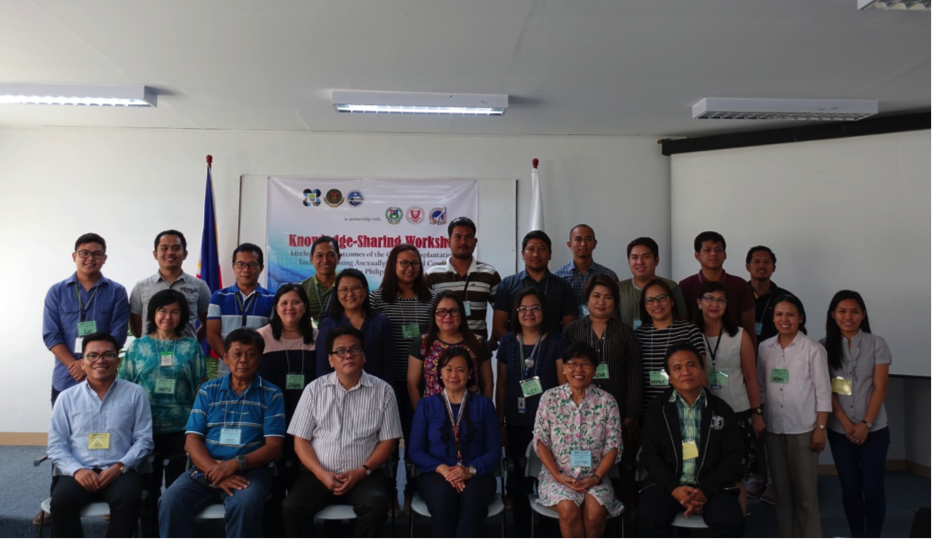
A collaborative session of multidisciplinary teams was organized by the School of Environmental Science and Management (SESAM) last May 11-12, 2017 at W.D. Dar Hall, DOST-PCAARRD, Los Baños, Laguna. The workshop entitled“Knowledge-Sharing Workshop on Methods and Outcomes of the Coral Transplantation Technology Using Asexually Reproduced Corals in the Philippines” was participated by representatives of the Department of Science and Technology– Philippine Council for Agriculture, Aquatic, and Natural Resources Research and Development (DOST-PCAARRD), Batangas State University, University of San Carlos, Mindanao State University, and graduate students of SESAM.
The country’s marine resources especially coral reef ecosystems are continuously being degraded due to anthropogenic activities coupled with natural factors. To address the issue, DOST-PCAARRD funded the Filipinnovation on Coral Rehabilitation Program in the Philippines in 2012-2013 that was tasked to develop a coral transplantation technology that can be used to rehabilitate degraded reef habitats. The technology made use of coral of opportunities (COPs) reared in Coral Nursery Units (CNUs) for transplantation in degraded reef areas which were done using various innovative approaches with the goal of increasing coral cover and biodiversity. Prior to scaling up this technology, an assessment is crucial to identify its strengths and weaknesses, thus, the conduct of the impact assessment project.
The Knowledge-Sharing workshop intends to bring together the individuals involved in the Filipinnovation program and the impact assessment Team to discuss the prospects and the directives for the impact evaluation. Specifically, it aimed to share and present updates on the impacts of the asexual reproduction technology that the Filipinnovation program implemented in selected sites in the Philippines last 2012 and at the same time, discussed the activities for the impact evaluation project that will be done for the program.
Dr. Decibel Eslava, the Dean of UPLB-SESAM, and Dr. Ernesto Brown, the Director of DOST-PCAARRD Socio-Economic Research Division, delivered messages to inspire the participants. Dr. Filipina B. Sotto, the program leader of the “Filipinnovation on Coral Reef Restoration Program”, presented the coral transplantation technology that they have implemented across 13 strategic restoration sites all over the country with the goal of restoring one hectare of degraded coral reef area in each of the pilot sites. She discussed the development process of the technology and the various modifications along the way in order to suit the capability of the coastal community and other stakeholders to carry out such projects. The Filipinnovation team from some of the pilot sites specifically Mabini Batangas, Panglao Bohol, Boracay Aklan, and Tawi-tawi shared the results, learnings, and innovation of their respective sites.
On the other hand, Dr. Rico C. Ancog, the project leader of the “Impact Assessment of the Filipinnovation on Coral Rehabilitation Program in the Philippines” (PhilCORA Project) discussed the objectives of the impact evaluation. The impact assessment will quantify the biophysical, social and economic consequences of the coral transplantation technology developed by the Filipinnovation team. A brief focus group discussion, facilitated by Dr. Canesio Predo, was conducted to solicit attributes for the choice experiment method that the PhilCORA team will use for reef valuation. The results of this impact assessment project would lead to the development of a management and monitoring protocol that can be applied for evaluating coral rehabilitation projects in the country.

A focus group discussion with the participants to solicit attributes to be used for the reef valuation.
The workshop concluded with talks on information sharing and on-site assistance through close coordination between DOST-PCAARRD representatives, the Filipinnovation team, and the PhilCORA team to ensure a systematic and objective approach for impact assessment. (AG Balatayo, MC Corales)
